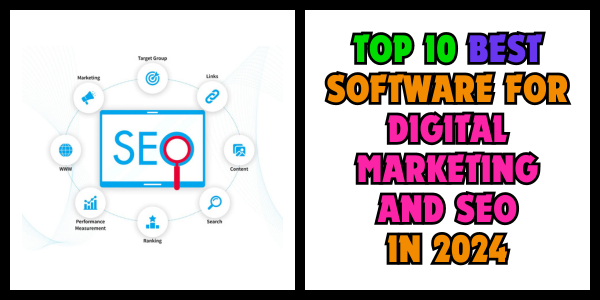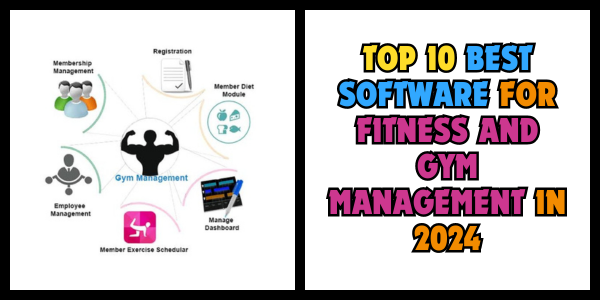Top 10 Software for Digital Marketing and SEO in 2024
In the fast-paced world of digital marketing, staying ahead of the competition requires the right set of tools. Whether you’re managing SEO, content marketing, social media, or paid advertising, having the best software can make a significant difference in your results. As we move into 2024, the landscape of digital marketing tools continues to evolve, with AI-powered features, enhanced analytics, and improved automation capabilities. In this article, we will explore the top 10 software for digital marketing and SEO in 2024, providing detailed insights into their features, pros, and cons to help you choose the best tools for your marketing needs.
1. SEMrush
SEMrush is a comprehensive digital marketing suite that has become a go-to tool for marketers worldwide. It offers a wide range of features, including keyword research, site audit, backlink analysis, and competitive research. SEMrush is particularly powerful for SEO, PPC, and content marketing, providing detailed analytics and actionable insights.
Key Features of SEMrush
- Keyword Research: Extensive database for keyword analysis, including search volume, keyword difficulty, and competitive analysis.
- Site Audit: Identifies technical SEO issues and provides recommendations for improvement.
- Backlink Analysis: Analyzes backlink profiles and tracks new and lost backlinks.
- Competitive Research: Allows you to spy on competitors’ strategies, including their top-performing keywords and ads.
- Content Marketing Toolkit: Helps optimize content for SEO and tracks content performance.
Pros of SEMrush
- Comprehensive tool with features for all aspects of digital marketing.
- Regularly updated with new features and improvements.
- Intuitive interface with easy-to-use tools.
- Extensive database for accurate keyword and competitor research.
- Excellent customer support and learning resources.
Cons of SEMrush
- Expensive, especially for small businesses or individual marketers.
- The vast array of features can be overwhelming for beginners.
- Limited customization options for reports.
2. Ahrefs
Ahrefs is a powerful SEO toolset known for its robust backlink analysis capabilities. It offers features such as keyword research, content analysis, rank tracking, and site audits. Ahrefs is widely used by SEO professionals and agencies to improve search rankings and monitor competitors.
Key Features of Ahrefs
- Backlink Analysis: One of the most extensive backlink databases available, providing insights into backlink profiles.
- Keyword Explorer: Comprehensive keyword research tool with metrics like search volume, keyword difficulty, and clicks.
- Site Explorer: Analyzes the organic search traffic and backlink profile of any website.
- Content Explorer: Finds top-performing content in any niche based on social shares, backlinks, and traffic.
- Rank Tracker: Monitors keyword rankings across search engines.
Pros of Ahrefs
- Best-in-class backlink analysis tool.
- Intuitive interface with easy navigation.
- Regular updates and improvements.
- Detailed and accurate keyword research data.
- Extensive learning resources and tutorials.
Cons of Ahrefs
- Expensive for small businesses and freelancers.
- Lacks some advanced features offered by competitors like SEMrush.
- No free plan; only a 7-day trial is available.
3. Moz Pro
Moz Pro is an all-in-one SEO software that offers tools for keyword research, site audits, rank tracking, and link building. Known for its user-friendly interface and comprehensive SEO features, Moz Pro is a popular choice among digital marketers and SEO professionals.
Key Features of Moz Pro
- Keyword Explorer: Helps you find high-quality keywords with metrics like search volume, difficulty, and organic CTR.
- Site Audit: Identifies and fixes technical SEO issues to improve site performance.
- Rank Tracking: Tracks your website’s rankings for targeted keywords.
- Link Explorer: Analyzes your website’s backlink profile and identifies new link opportunities.
- On-Page Optimization: Provides recommendations for optimizing on-page elements like titles, meta descriptions, and headers.
Pros of Moz Pro
- User-friendly interface with easy-to-understand reports.
- Strong community support and educational resources.
- Excellent for both beginners and experienced SEOs.
- Accurate rank tracking and keyword research tools.
- Regular updates and new features.
Cons of Moz Pro
- Limited data compared to competitors like Ahrefs and SEMrush.
- Expensive for advanced features and larger campaigns.
- Slower site audits compared to other tools.
Read More: TOP 10 BEST AI-POWERED SOFTWARE TOOLS IN 2024
4. Google Analytics 4
Google Analytics 4 (GA4) is the latest version of Google’s web analytics platform, offering advanced tracking and reporting capabilities. GA4 provides detailed insights into user behavior, traffic sources, and conversions, making it an essential tool for digital marketers.
Key Features of Google Analytics 4
- Event-Based Tracking: Tracks user interactions as events, providing more granular data.
- Cross-Platform Tracking: Analyzes user behavior across web and mobile apps.
- Advanced Reporting: Customizable reports with insights into user journeys and conversions.
- Predictive Metrics: AI-driven predictions for user behavior and outcomes.
- Integration with Google Ads: Seamless integration for tracking ad performance and conversions.
Pros of Google Analytics 4
- Free to use with powerful analytics capabilities.
- Seamless integration with other Google tools like Google Ads and Search Console.
- Detailed insights into user behavior and conversions.
- Customizable reports and dashboards.
- AI-driven insights and predictions.
Cons of Google Analytics 4
- Steep learning curve for beginners.
- Limited support and documentation for advanced features.
- Complex setup and configuration for accurate tracking.
5. HubSpot Marketing Hub
HubSpot Marketing Hub is an all-in-one inbound marketing platform that offers tools for email marketing, social media management, SEO, content creation, and more. It is designed to help businesses attract, engage, and delight customers throughout their buyer’s journey.
Key Features of HubSpot Marketing Hub
- SEO Tools: Helps optimize content for search engines and track performance.
- Content Creation: Built-in tools for creating and managing blogs, landing pages, and emails.
- Social Media Management: Schedules and tracks social media posts across platforms.
- Email Marketing: Automated email campaigns with personalized content.
- Analytics and Reporting: Detailed reports on traffic, leads, and conversions.
Pros of HubSpot Marketing Hub
- Comprehensive toolset for inbound marketing.
- User-friendly interface with easy integration across HubSpot’s CRM and sales tools.
- Strong focus on content marketing and lead nurturing.
- Extensive educational resources and support.
- Scalable for businesses of all sizes.
Cons of HubSpot Marketing Hub
- Expensive, especially for advanced features and larger teams.
- Limited customization options for certain tools.
- Requires a learning curve for users new to inbound marketing.
6. Canva Pro
Canva Pro is a popular graphic design tool that offers a wide range of templates and design elements for creating visuals for social media, websites, and marketing campaigns. Canva Pro is a favorite among digital marketers for its ease of use and versatility.
Key Features of Canva Pro
- Templates and Design Elements: Thousands of customizable templates for social media posts, infographics, presentations, and more.
- Brand Kit: Stores brand colors, fonts, and logos for consistent branding across designs.
- Collaboration Tools: Allows teams to collaborate on designs in real-time.
- Content Planner: Schedules and publishes social media posts directly from Canva.
- Unlimited Storage: Stores all your designs and assets in one place.
Pros of Canva Pro
- User-friendly interface with drag-and-drop functionality.
- Extensive library of templates and design elements.
- Affordable pricing with a free version available.
- Excellent for creating branded content and marketing materials.
- Regular updates with new features and templates.
Cons of Canva Pro
- Limited advanced design features compared to professional tools like Adobe Creative Suite.
- Collaboration features can be slow with large teams.
- Requires an internet connection for most features.
7. Hootsuite
Hootsuite is a leading social media management platform that helps businesses schedule, publish, and analyze social media content. It supports multiple social networks, making it easy to manage all your social media accounts in one place.
Key Features of Hootsuite
- Social Media Scheduling: Plan and schedule posts across multiple platforms in advance.
- Social Listening: Monitors social media for brand mentions and customer sentiment.
- Analytics and Reporting: Tracks social media performance and provides insights into audience engagement.
- Team Collaboration: Allows teams to manage social media accounts together with approval workflows.
- Content Library: Stores and organizes social media assets for easy access.
Pros of Hootsuite
- Supports a wide range of social networks.
- User-friendly interface with easy-to-use scheduling tools.
- Strong analytics and reporting features.
- Excellent for managing multiple social media accounts.
- Scalable for businesses of all sizes.
Cons of Hootsuite
- Expensive for small businesses and individual users.
- Limited functionality in the free plan.
- Some advanced features require additional integrations or upgrades.
8. Mailchimp
Mailchimp is a popular email marketing platform that offers tools for creating, sending, and analyzing email campaigns. It is known for its user-friendly interface and powerful automation features, making it a top choice for digital marketers.
Key Features of Mailchimp
- Email Campaigns: Create and send email newsletters, promotions, and automated campaigns.
- Audience Segmentation: Segments your audience based on behavior, preferences, and demographics.
- Automation: Automates email workflows for welcome emails, abandoned carts, and more.
- Analytics and Reporting: Tracks open rates, click-through rates, and conversions.
- Landing Pages and Forms: Creates landing pages and signup forms to grow your email list.
Pros of Mailchimp
- User-friendly interface with drag-and-drop email builder.
- Comprehensive automation features for email marketing.
- Free plan available with basic features.
- Integration with a wide range of apps and platforms.
- Strong analytics and reporting tools.
Cons of Mailchimp
- Limited features in the free plan.
- Expensive for advanced features and large contact lists.
- Some templates and customization options are limited.
9. BuzzSumo
BuzzSumo is a content research and social media analytics tool that helps marketers discover trending topics, analyze content performance, and monitor brand mentions. It is particularly useful for content marketers and social media managers looking to create engaging and shareable content.
Key Features of BuzzSumo
- Content Research: Identifies trending topics and top-performing content in any niche.
- Social Media Analytics: Analyzes social media shares and engagement for content.
- Brand Monitoring: Tracks brand mentions and competitor activity across social networks.
- Influencer Identification: Finds influencers in your industry to amplify your content.
- Content Alerts: Sets up alerts for new content, mentions, and backlinks.
Pros of BuzzSumo
- Excellent for content discovery and trend analysis.
- Easy-to-use interface with powerful search capabilities.
- Helps identify and connect with influencers.
- Provides insights into competitor content strategies.
- Useful for monitoring brand reputation online.
Cons of BuzzSumo
- Expensive for small businesses and individual marketers.
- Limited customization options for reports and alerts.
- Some features require higher-tier plans.
10. Screaming Frog SEO Spider
Screaming Frog SEO Spider is a website crawler that helps marketers and SEO professionals audit websites for technical issues. It is a powerful tool for identifying broken links, duplicate content, and other on-page SEO issues.
Key Features of Screaming Frog SEO Spider
- Site Audits: Crawls websites to identify technical SEO issues like broken links, redirects, and duplicate content.
- Custom Search: Allows you to search for specific data on your website, such as meta descriptions or H1 tags.
- Integration with Google Analytics: Combines crawl data with Google Analytics for deeper insights.
- XML Sitemap Generation: Creates XML sitemaps for better search engine indexing.
- In-Depth Reports: Provides detailed reports on site structure, performance, and issues.
Pros of Screaming Frog SEO Spider
- Powerful and flexible tool for technical SEO audits.
- Customizable settings for advanced users.
- Provides detailed insights into site performance and structure.
- Integrates with Google Analytics and Google Search Console.
- Free version available with limited features.
Cons of Screaming Frog SEO Spider
- Steep learning curve for beginners.
- Limited features in the free version.
- Requires a high-performance computer for large site crawls.
Conclusion
Choosing the right digital marketing and SEO software in 2024 is crucial for the success of your online campaigns. Each tool on this list offers unique features and capabilities, making it easier to manage various aspects of your marketing strategy, from SEO and content creation to social media management and email marketing. Whether you’re a small business owner, a digital marketing professional, or an SEO expert, there’s a tool in this list that can help you achieve your goals. However, it’s important to weigh the pros and cons of each software to find the one that best suits your needs and budget.
By leveraging the power of these top digital marketing tools, you can stay ahead of the competition, improve your online visibility, and drive more traffic, leads, and sales for your business in 2024 and beyond.











Leave a Comment